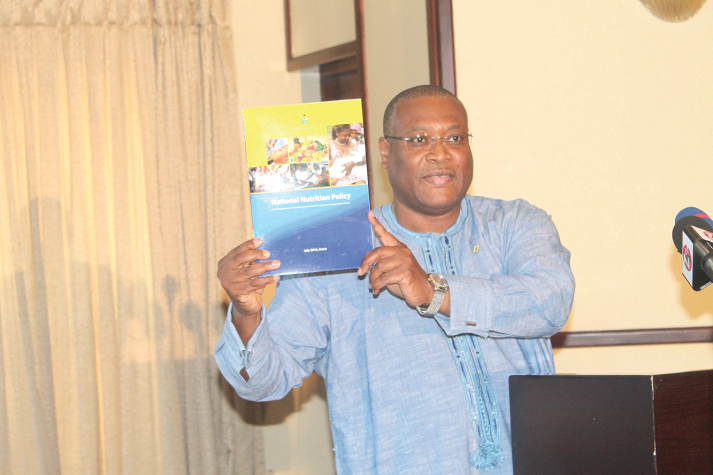
National Nutritional Policy launched
The policy was developed and launched against the backdrop that 66 per cent of children in the country and 42 per cent of women in their reproductive ages are also anaemic.
Advertisement
Anaemia is a condition that develops when blood does not contain enough healthy red blood cells or haemoglobin. These cells are important for carrying oxygen around the body.
The policy was developed by the Ghana Health Service (GHS) recognising the need to accelerate actions to fast-track reduction of undernutrition, prevent further increases in overweight and obesity and promote national health.
The policy is aimed at scaling up evidence-based nutrition-specific and nutrition-sensitive interventions and ensuring an enabling environment for effective and sustained impact.
Regionally, the condition is lowest among children in the Ashanti Region, which is 54 per cent, and highest in the Northern Region, which is 82 per cent.
Malnutrition in Ghana
The Minister of Health, Mr Alexander P. Segbefia, who launched the policy, said despite the progress made, about one out of every five children under the age of five in the country suffered from stunting.
“Stunting occurs when children do not get appropriate food to eat, especially during the first two years of life, and we are informed that stunting is largely irreversible after two years,” he said.
Mr Segbefia said over the last two decades, the prevalence of underweight, wasting and stunting had all shown remarkable reduction, saying that stunting, for instance, had dropped from about 35 per cent to the current prevalence of under 19 per cent.
That condition, he said, was attributable to collective efforts to implement proven interventions such as optimal nutrition for children including the promotion of exclusive breastfeeding, timely appropriate introduction of complementary food and effective management of those who became severely malnourished, among other interventions.
Mr Segbefia called for the need to operationalise strategies and initiatives in the nutrition policy for ensuring healthy diets throughout the life course and at the same time identify and foster appropriate policy options, as well as develop a package of tools for creating institutional capacities and skills to promote healthy and diversified diets.
Behaviour change
“We need to strengthen behavioural change communication to empower people and create an enabling environment for making informed choices about food products for healthy dietary practices and appropriate infant and young child-feeding practices,” he added.
In a presentation on behalf of the GHS, Dr Patrick Aboagye, Director, Family Health Division, said the nutritional status of children in the country had generally improved since 2003 as there had been a reduction in stunting in almost all the regions.
However, he said overweight and obesity had increased among women from 25 per cent in 2003 to 40 per cent in 2014.
He said although there had been impressive progress in many areas such as exclusive breastfeeding, vitamin A supplementation and skilled delivery, there was still more to be done.
He, therefore, called for the need to strengthen support and accountability at all levels for addressing the remaining problems, as well as scale up improvements in both nutrition-specific actions and the enabling nutrition-sensitive actions.
Developing partners support
The UNICEF Regional Nutrition Advisor, Ms Nita Dalmiya, in a message, said there was the need for a revitalisation of global partnerships for development, adding that nutrition was a leading way.
Representatives from USAID, UN agencies, JICA and Canada all pledged their support to ensuring that malnutrition was eradicated, saying that nutrition was a cross-cutting issue which needed to be handled from all sectors of the economy.



